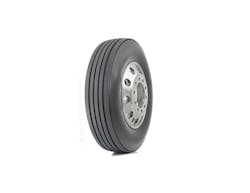EPA picks Yokohama tire casing as baseline SmartWay retread product
The U.S. Environmental Protection Agency has identified a Yokohama Tire Corp. product as the baseline tire casing for retreaded products, according to Yokohama.
The company said EPA will use the RY617 steer and all-position tire as the benchmark product for retreaded tires seeking EPA SmartWay certification.
“We are excited that the EPA has designated the RY617 steer and all-position tire for their verification program as the benchmark casing for retread technologies,” said Rick Phillips, Yokohama director of commercial sales. “That means all retread solutions will be measured against a target number for rolling resistance on our casing. This is an important and necessary initiative by the EPA to incorporate retreading into the SmartWay program. It has been instrumental in helping the trucking industry become more fuel efficient and we are very glad to have our casing represent the benchmark.”
According to Yokohama, EPA sent a letter to media and other tire companies describing the newly-defined test casing as “an American-made Yokohama Super Steel RY617 in size 295/75R22.5. It will be used for all treads with conventional-width tires used in dual configuration.”
